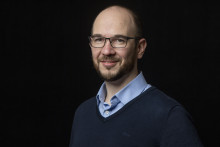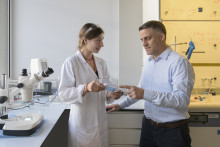‘My research is very fundamental, but the big challenge I want to contribute to is storing renewable energy through hydrogen formation, which is needed to reach our climate goals,’ says Christoph Baeumer, assistant professor at the Inorganic Materials Science group of the University of Twente. He was awarded the ERC Starting Grant for his project Interfaces at Work (Interface-sensitive Spectroscopy of Atomically-defined Solid/Liquid Interfaces Under Operating Conditions).
Baeumer is a material scientist by training. ‘That means I design and perform experiments to understand how properties of energy materials determine their function. We want to understand these properties and functions down to the atomic level, so that we can use the materials in the most efficient way,’ he says. The UT scientist has worked on energy research for several years now. He has focused on the solid/liquid interface, in particular for electrocatalysts. In simple terms, electrocatalysts are materials that enable chemical reactions that use electrical energy, for example to store sustainable energy in chemical fuels.
Christoph Baeumer
Background: PhD in Physics at RWTH Aachen University and Forschungszentrum Jülich
Current position: Assistant Professor
Works at: Inorganic Materials Science group, Faculty of Science and Technology (TNW), University of Twente
ERC Project: Interfaces at Work - Interface-sensitive Spectroscopy of Atomically-defined Solid/Liquid Interfaces Under Operating Conditions
Storing renewable energy
To meet the challenges of climate change, renewable energy sources should replace current fossil fuel based technologies as soon as possible. However, renewable energy sources such as solar and wind cannot produce energy at all hours of the day, and we therefore need new and more efficient ways of storing this energy. Baeumer’s ERC project aims to contribute to this.
‘Energy transformation and storage options such as conversion to chemical fuel are necessary,’ explains the researcher. ‘The simplest and most attractive candidate for climate-neutral fuel is the production of hydrogen through power-to-gas approaches. Excess electricity from renewable energy can be used to split water into hydrogen and oxygen gas. You can say that the ultimate goal is a better way to create hydrogen and my goal is to deliver a better understanding of how to do that. There are some existing methods, but the energy we put into it is not in line with what we get out of it.’

Electrocatalysts
In order to create a more efficient method, we need electrocatalyst materials. ‘And that is what I want to investigate,’ says Baeumer. ‘For the water-splitting reaction, catalyst materials are required. We know that catalysts change during the reaction, but we don’t know what they change into, we don’t know the material properties. While we begin to split water into oxygen and hydrogen, the surface of the catalyst changes the chemical composition, the structure and the electronic properties as well. All of these properties determine if the material can be a good catalyst, and so we need to understand what happens during the reaction. Only once we know that, can we create the next generation of efficient catalysts materials.’
To find out how the catalysts change, Baeumer’s team will use a special, one-of-a-kind machine which they are co-developing with the manufacturer. The device will allow them to do X-ray photo-electronic spectroscopy and run various experiments while the water splitting reaction occurs, which is a very new but urgently needed development.
Broad impact
‘The research is very fundamental, but could ultimately lead to the next generation of energy storage devices, devices that are more efficient. This would entail hydrogen, but also other e-fuels and even battery materials. In the long run, I believe this research can have a very broad impact,’ stresses the UT scientist.
erc starting grants
The ERC Starting Grants are designed to support early-career researchers who are starting their own independent research team or programme. The success rate of receiving the grant was 9,8% this year. Out of nearly four hundred grants awarded this year, 44 went to scientists in the Netherlands, including three at the UT: Christoph Baeumer, Nienke Bosschaart and Sander Huisman.
‘Without the ERC grant, doing this research would certainly take much much longer,’ says Baeumer. ‘The machine is being funded through a different scheme, and so the ERC grant money will mostly be used to hire scientists who can design the experiments and run the equipment. The experiments we will do haven’t been done before, and so there is a lot of need for creativity and optimization. There is a lot to do and I’m excited to get started.’
‘For me as a fundamental researcher, the ERC grant is very attractive,’ adds Baeumer. ‘It doesn’t come with a hard set of deliverables, it only opens possibilities to new science. Without grants like these, we wouldn’t be able to do the fundamental research I truly believe we need.’







